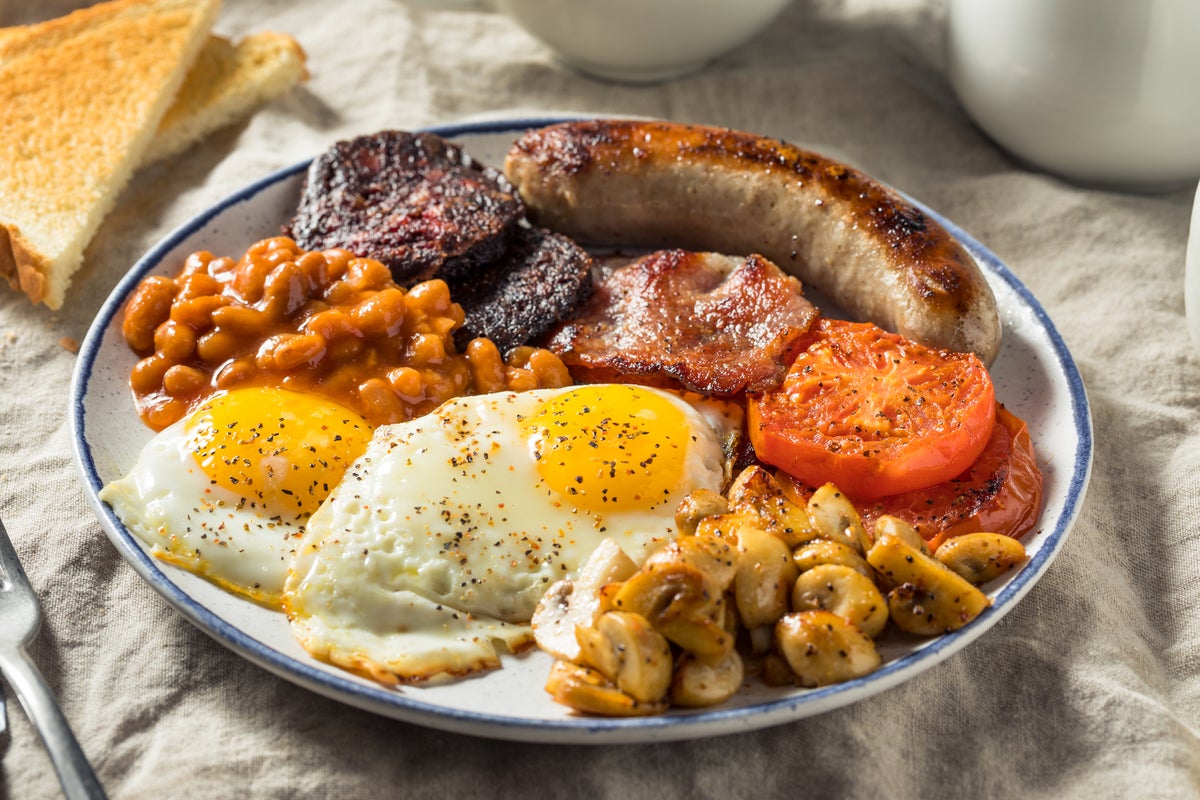Bacon, beans and a side of scandal: The secret history of the full English

London’s Borough Market has always been a place where appetite meets history. For centuries, it’s been a sprawling, ever-changing hub of food. Today, beneath its Victorian ironwork and on its cobbled lanes, you’ll still find flavours both old and new.
And tucked into one corner of the market, Maria’s Market Cafe continues to serve up that most enduring of meals – the full English breakfast – to everyone from delivery drivers to City execs. It’s a plate with deep roots, a complicated backstory and a surprising ability to unite us all.
When it comes to the origin of the full English, Kenelm Digby, one of the more colourful characters in the history of food writing, may – or may not – have the answer. Lying was, it was said, “his infirmity”. Did he really fake his own death to avoid sleeping with the King of France’s mum? Did he really kill a man on a Paris street? Did the “powder of sympathy” gifted to him by a mysterious monk really heal wounds from a distance? Questionable at best.
But one of Digby’s claims is irrefutable: “Two poched [sic] eggs with a few fine dry-fryed collops of pure bacon are not bad for break-fast,” he wrote in 1669. Few have argued since.
Eggs and bacon are the twin pillars of the full English – a dish that manages to be both universally familiar and impossible to define without igniting a row. (Let’s go with the 1964 US Supreme Court test for obscenity: “I know it when I see it.”)
The British have been breeding pigs and chickens, curing bacon, stuffing sausages and turning blood into black pudding since long before “England” was even a thing. But the idea of eating all of that first thing in the morning? That’s relatively new. On this matter, Kenelm Digby was ahead of his time.
In medieval England, breakfast was a modest affair: bread, porridge or gruel washed down with weak ale. As towns grew and workers moved from fields to factories, breakfast edged earlier in the day – but still without much bacon and egg in sight. Samuel Pepys’s 1660s diaries mention breakfasts of mince pies and radishes, with just a single nod to eggs.
It wasn’t until the 18th and 19th centuries that the idea of a more elaborate, protein-heavy breakfast took hold – and it did so in the grand kitchens of the elite. Wealth, empire and increasing domestic staff gave rise to vast breakfast spreads. Bacon and eggs were present, yes – but alongside sheep’s kidneys, mackerel, whiting, veal pies, even collared pig’s face. In The Breakfast Book (1865), Georgiana Hill lists among the usual suspects: bloaters, brain cakes, devilled bones, caviar and curries.
These were solid, substantial foods: expressions of Victorian virtues – robust, plain, defiantly un-French. The culinary equivalent of a cold bath or foxhunt. By contrast, the growing middle class, egged on by Mrs Beeton and her bestselling Book of Household Management, tried to replicate these grand spreads – but with less time, money, or kitchen help. Enter the simplified version: bacon, eggs, sausages, mushrooms, toast. All manageable on a domestic stove, all status-symbolic enough to pass.

As the 20th century progressed, the full English broke free of the country house. Grand hotels, boarding schools, factory canteens and boarding houses all embraced it. In 1936, George Orwell, staying in a grotty Wigan terrace, was fed “two rashers of bacon and a pale fried egg, and bread-and-butter which had often been cut overnight and always had thumbmarks on it.” Mrs Beeton would not have approved.
Snobbish cookery writers, aghast at corners being cut, wailed at the shunning of sweetbreads, cod’s roe and fricasseed fowl. As Colonel Arthur Kenney Herbert wrote in the introduction to Fifty Breakfasts (1894): “The ding-dong monotony of ‘bacon and eggs’ alternated with ‘eggs and bacon’ of many English breakfast tables is wholly inexcusable.”
That monotony was finally broken by the Second World War, but not in a good way, as strict rationing of bacon and eggs condemned us once again to be a nation of porridge eaters. As Ambrose Heath reported in Good Breakfasts (1940): “The lack of bacon has disturbed our native breakfast dish and brought doubt and distress into many an early morning kitchen.” Forget the Blitz – this was the true national crisis.
Rationing ended in the 1950s. And with the post-war economic boom, mass food production and shrinking wealth gaps, a lavish home-cooked fry-up became possible for almost everyone. Greasy spoons – a term, sad to report, imported from America – sprang up across Britain. These caffs were democratic spaces: fast, affordable and unpretentious. The menu staples: strong tea, beans from a tin, bacon fried crisp, sausages of unknown provenance and eggs of variable runniness.
View this post on Instagram
Interestingly, many of these caffs weren’t English at all in origin. They were opened and run by Italians, Cypriots, Turks, Bangladeshis and Chinese families – immigrants who helped shape and sustain one of the most traditional English dishes.
Maria’s Market Cafe, one of the true survivors of the golden age of the caff, was one of the many London caffs with Italian roots. After moving to the capital in the early 1960s, the Moruzzi family opened the Borough Cafe on Park Street. The market back then was a vast fruit and veg wholesale operation staffed by hundreds of burly porters, and many of the cafe’s regulars would be coming off a night shift, proving that a full English doesn’t have to be the first meal of the working day – it can also be the last.
Under the management of Maria Moruzzi, the cafe that now bears her name moved to the heart of the revitalised retail market in 2012. Maria retired in 2021 with more than 50 years of service under her apron, but the Moruzzi legacy lives on in a classic full English breakfast still redolent of Borough Market’s past.
Maria’s embodies the ability of a cooked breakfast to transcend social class in a way that few other English foods ever will.
Depending on the setting, a full English can express the country-house grandeur that birthed it or the post-war populism that made it universal. You can buy one for £56 at The Ritz or a fraction of that at Maria’s (with no compromise on quality). You can argue about black pudding or baked beans or whatever bugbear you happen to hold. But whatever your choices, you’ll grasp the truth that binds this nation tight: that two eggs with a few fine dry-fried rashers of bacon (plus three or four other elements) are not bad for breakfast.
Borough Market is one of London’s oldest and most renowned food markets, operating as a charitable trust that supports its community of shoppers, traders and neighbours. Located near London Bridge, the market has been a hub for traders and food lovers for over 1,000 years. For more information, visit boroughmarket.org.uk.
[title_words_as_hashtags



